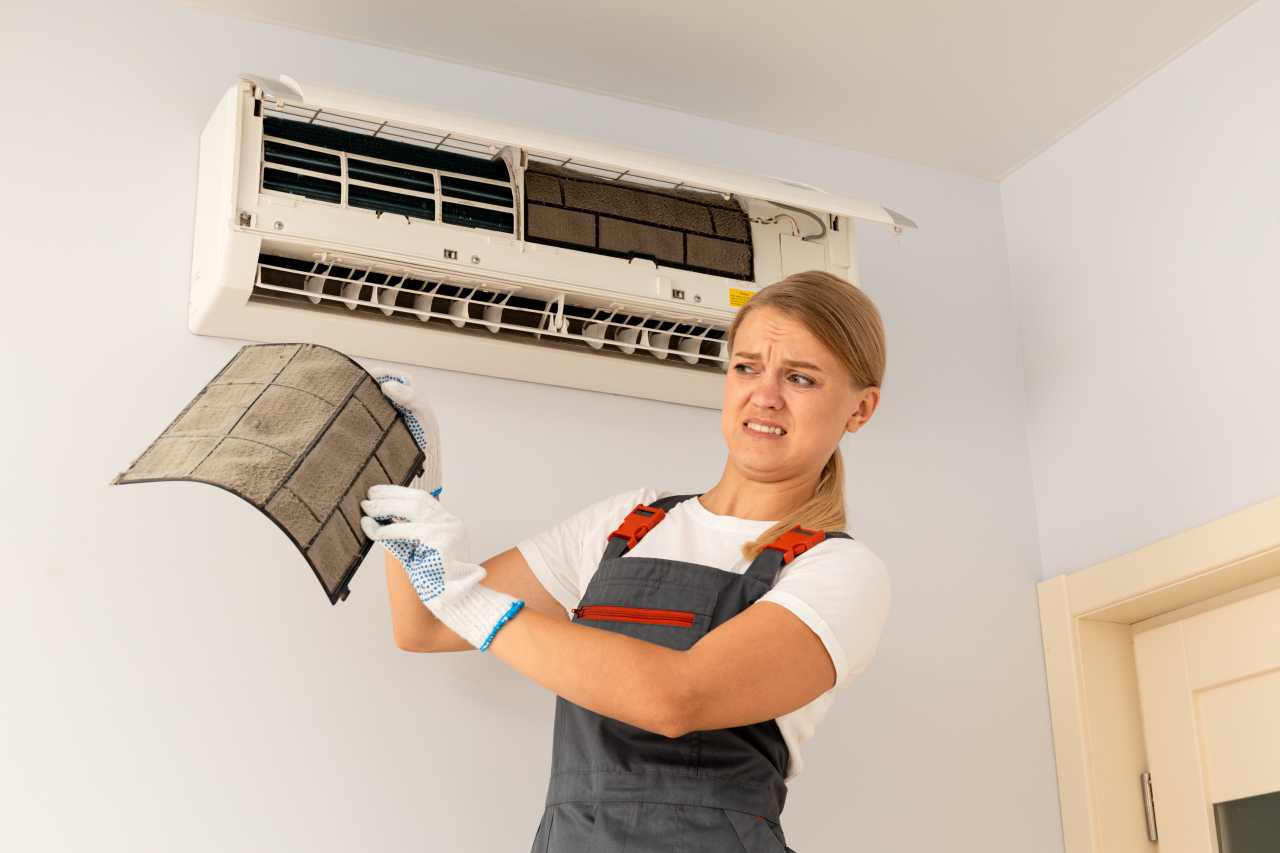Common Pitfalls in DIY Air Conditioning Repairs: How to Avoid Them
When the summer heat in Newark becomes unbearable, a functional air conditioner is a lifesaver. However, when your AC system breaks down, the temptation to fix it yourself can be overwhelming. While DIY air conditioning repair might seem cost-effective, it can lead to costly mistakes and safety hazards. This blog post aims to guide you […]

female master and air conditioner, air conditioner repair
When the summer heat in Newark becomes unbearable, a functional air conditioner is a lifesaver. However, when your AC system breaks down, the temptation to fix it yourself can be overwhelming. While DIY air conditioning repair might seem cost-effective, it can lead to costly mistakes and safety hazards. This blog post aims to guide you through common pitfalls to avoid when attempting to repair your air conditioner. You will learn practical tips and expert insights to help you make informed decisions and ensure your comfort during Newark’s hottest months.
Understanding Your Air Conditioning System
Air conditioners typically have five main parts: the compressor, condenser, evaporator coil, expansion valve, and refrigerant. The compressor pumps refrigerant through the system while the condenser coil releases the collected heat outside. The evaporator coil absorbs heat from your home, and the expansion valve regulates the refrigerant flow.
However, even with this knowledge, it is important to recognize that air conditioning systems are complex. Misdiagnosing an issue can lead to further problems, highlighting the importance of professional assistance in many cases. For residents in need of help, air conditioning repair Newark services can provide the expertise required to ensure the system operates efficiently and effectively.
The Risk of Overlooking Safety Precautions
Safety should always be your top priority when dealing with air conditioning repairs. Many DIY enthusiasts underestimate the hazards involved, which can result in severe injuries or property damage. One of the most significant risks is electrical shock. Air conditioners operate at high voltages; mishandling electrical components can be dangerous. Always ensure the power is off before starting any repair work. Additionally, refrigerants used in air conditioners are hazardous chemicals. Exposure can cause skin irritation, respiratory issues, and other health problems. Proper safety gear, including gloves and goggles, is essential.
Misdiagnosing the Problem
One of the most common pitfalls in DIY air conditioning repair is misdiagnosing the problem. Without proper training and experience, identifying the root cause of an issue can be challenging. For instance, a common symptom like poor cooling could be caused by various factors, including low refrigerant levels, a dirty filter, or a malfunctioning compressor. Misdiagnosing the issue can lead to unnecessary repairs and additional costs. It is essential to conduct thorough research and possibly consult online guides or forums to understand the symptoms you are observing better.
Using the Wrong Tools and Equipment
Another common mistake is using improper tools and equipment for repairs. Air conditioning systems require specialized tools often unavailable in a standard toolbox. For example, using a regular wrench instead of a torque wrench can lead to over-tightening or under-tightening components, causing leaks or weakening structural integrity. Additionally, improper handling of refrigerants without the right equipment can lead to spills and exposure to harmful chemicals. Investing in the correct tools or consulting a professional can prevent these issues.
Skipping Routine Maintenance
Routine maintenance is crucial for the longevity and efficiency of your air conditioning system. However, many homeowners overlook this aspect, leading to recurring issues and frequent breakdowns. Common maintenance tasks include cleaning or replacing air filters, checking refrigerant levels, and inspecting condensers and evaporator coils. Neglecting these tasks can cause your system to work harder than necessary, resulting in higher energy bills and a shorter lifespan for your unit.
Buying Incompatible Parts
When repairing your air conditioner, it is crucial to use compatible parts for the system’s performance and longevity. However, many DIY enthusiasts make the mistake of buying incompatible or substandard parts. For example, an incorrect capacitor can affect the compressor’s performance, leading to overheating and potential failure. Always ensure you purchase parts specifically designed for your air conditioning model.
Misunderstanding Thermostat Issues
Thermostat issues are a common cause of air conditioning problems but are often misunderstood. Misdiagnosing thermostat issues can lead to unnecessary repairs and ongoing discomfort. A malfunctioning thermostat can cause your system to run inefficiently or not at all. Common issues include incorrect settings, dead batteries, or a need for calibration. Always check the thermostat first before assuming a major problem with your air conditioning system. Ensure it is set to the correct mode and temperature, and replace batteries if needed.
Underestimating the Importance of Airflow
Proper airflow is essential for the efficient operation of your air conditioning system. Many DIY enthusiasts underestimate the importance of airflow, which can lead to recurring issues and reduced performance. Blocked or dirty air filters, closed vents, and obstructed ductwork can all hinder airflow, causing your system to work harder and less efficiently. Regularly cleaning or replacing air filters and ensuring open and unobstructed vents can significantly improve airflow and system performance.
Conclusion
DIY repairing your air conditioner can offer a sense of achievement and potential cost savings, but it is essential to be aware of the common pitfalls. Remember, while DIY repairs can be tempting, professional assistance often provides the best results. If you are unsure about any aspect of your air conditioning system, do not hesitate to reach out to a certified technician.
